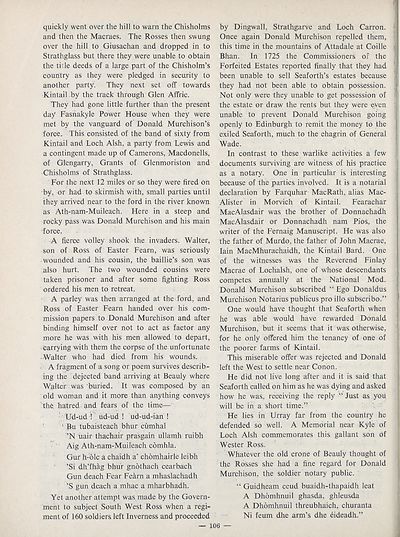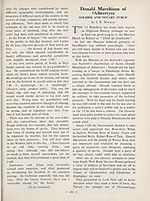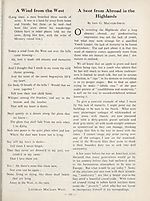An Comunn Gàidhealach Publications > Gaidheal > Volumes 58--62(part), January, 1963--March 1967
(146) Page 106
Download files
Complete book:
Individual page:
Thumbnail gallery: Grid view | List view

quickly went over the hill to warn the Chisholms
and then the Macraes. The Rosses then swung
over the hill to Giusachan and dropped in to
Strathglass but there they were unable to obtain
the title deeds of a large part of the Chisholm’s
country as they were pledged in security to
another party. They next set off towards
Kintail by the track through Glen Affric.
They had gone little further than the present
day Fashakyle Power House when they were
met by the vanguard of Donald Murchison’s
force. This consisted of the band of sixty from
Kintail and Loch Alsh, a party from Lewis and
a contingent made up of Camerons, Macdonells,
of Glengarry, Grants of Glenmoriston and
Chisholms of Strathglass.
For the next 12 miles or so they were fired on
by, or had to skirmish with, small parties until
they arrived near to the ford in the river known
as Ath-nam-Muileach. Here in a steep and
rocky pass was Donald Murchison and his main
force.
A fierce volley shook the invaders. Walter,
son of Ross of Easter Fearn, was seriously
wounded and his cousin, the baillie’s son was
also hurt. The two wounded cousins were
taken prisoner and after some fighting Ross
ordered his men to retreat.
A parley was then arranged at the ford, and
Ross of Easter Fearn handed over his com¬
mission papers to Donald Murchison and after
binding himself over not to act as factor any
more he was with his men allowed to depart,
Carrying with them the corpse of the unfortunate
Walter who had died from his wounds.
A fragment of a song or poem survives describ¬
ing the dejected band arriving at Beauly where
Walter was buried. It was composed by an
old woman and it more than anything conveys
the hatred and fears of the time—
Ud-ud ! ud-ud ! ud-ud-ian !
' Bu tubaisteach bhur cumhal
’N uair thachair prasgain ullamh ruibh
Aig Ath-nam-Muileach comhla.
Gur h-61c a chaidh a’ chomhairle leibh
’Si dh’fhag bhur gnothach cearbach
Gun deach Fear Fearn a mhaslachadh
’S gun deach a mhac a mharbhadh.
Yet another attempt was made by the Govern¬
ment to subject South West Ross when a regi¬
ment of 160 soldiers left Inverness and proceeded
by Dingwall, Strathgarve and Loch Carron.
Once again Donald Murchison repelled them,
this time in the mountains of Attadale at Coille
Bhan. In 1725 the Commissioners of the
Forfeited Estates reported finally that they had
been unable to sell Seaforth’s estates because
they had not been able to obtain possession.
Not only were they unable to get possession of
the estate or draw the rents but they were even
unable to prevent Donald Murchison going
openly to Edinburgh to remit the money to the
exiled Seaforth, much to the chagrin of General
Wade.
In contrast to these warlike activities a few
documents surviving are witness of his practice
as a notary. One in particular is interesting
because of the parties involved. It is a notarial
declaration by Farquhar MacRath, alias Mac-
Alister in Morvich of Kintail. Fearachar
MacAlasdair was the brother of Donnachadh
MacAlasdair or Donnachadh nam Pios, the
writer of the Fernaig Manuscript. He was also
the father of Murdo, the father of John Macrae,
Iain MacMhurachaidh, the Kintail Bard. One
of the witnesses was the Reverend Finlay
Macrae of Lochalsh, one of whose descendants
competes annually at the National Mod.
Donald Murchison subscribed “ Ego Donaldus
Murchison Notarius publicus pro illo subscribo.”
One would have thought that Seaforth when
he was able would have rewarded Donald
Murchison, but it seems that it was otherwise,
for he only offered him the tenancy of one of
the poorer farms of Kintail.
This miserable offer was rejected and Donald
left the West to settle near Conon.
He did not live long after and it is said that
Seaforth called on him as he was dying and asked
how he was, receiving the reply “ Just as you
will be in a short time.”
He lies in Urray far from the country he
defended so well. A Memorial near Kyle of
Loch Alsh commemorates this gallant son of
Wester Ross.
Whatever the old crone of Beauly thought of
the Rosses she had a fine regard for Donald
Murchison, the soldier notary public.
“ Guidheam ceud buaidh-thapaidh leat
A Dhomhnuil ghasda, ghleusda
A Dhomhnuil threubhaich, churanta
Ni feum dhe arm’s dhe eideadh.”
and then the Macraes. The Rosses then swung
over the hill to Giusachan and dropped in to
Strathglass but there they were unable to obtain
the title deeds of a large part of the Chisholm’s
country as they were pledged in security to
another party. They next set off towards
Kintail by the track through Glen Affric.
They had gone little further than the present
day Fashakyle Power House when they were
met by the vanguard of Donald Murchison’s
force. This consisted of the band of sixty from
Kintail and Loch Alsh, a party from Lewis and
a contingent made up of Camerons, Macdonells,
of Glengarry, Grants of Glenmoriston and
Chisholms of Strathglass.
For the next 12 miles or so they were fired on
by, or had to skirmish with, small parties until
they arrived near to the ford in the river known
as Ath-nam-Muileach. Here in a steep and
rocky pass was Donald Murchison and his main
force.
A fierce volley shook the invaders. Walter,
son of Ross of Easter Fearn, was seriously
wounded and his cousin, the baillie’s son was
also hurt. The two wounded cousins were
taken prisoner and after some fighting Ross
ordered his men to retreat.
A parley was then arranged at the ford, and
Ross of Easter Fearn handed over his com¬
mission papers to Donald Murchison and after
binding himself over not to act as factor any
more he was with his men allowed to depart,
Carrying with them the corpse of the unfortunate
Walter who had died from his wounds.
A fragment of a song or poem survives describ¬
ing the dejected band arriving at Beauly where
Walter was buried. It was composed by an
old woman and it more than anything conveys
the hatred and fears of the time—
Ud-ud ! ud-ud ! ud-ud-ian !
' Bu tubaisteach bhur cumhal
’N uair thachair prasgain ullamh ruibh
Aig Ath-nam-Muileach comhla.
Gur h-61c a chaidh a’ chomhairle leibh
’Si dh’fhag bhur gnothach cearbach
Gun deach Fear Fearn a mhaslachadh
’S gun deach a mhac a mharbhadh.
Yet another attempt was made by the Govern¬
ment to subject South West Ross when a regi¬
ment of 160 soldiers left Inverness and proceeded
by Dingwall, Strathgarve and Loch Carron.
Once again Donald Murchison repelled them,
this time in the mountains of Attadale at Coille
Bhan. In 1725 the Commissioners of the
Forfeited Estates reported finally that they had
been unable to sell Seaforth’s estates because
they had not been able to obtain possession.
Not only were they unable to get possession of
the estate or draw the rents but they were even
unable to prevent Donald Murchison going
openly to Edinburgh to remit the money to the
exiled Seaforth, much to the chagrin of General
Wade.
In contrast to these warlike activities a few
documents surviving are witness of his practice
as a notary. One in particular is interesting
because of the parties involved. It is a notarial
declaration by Farquhar MacRath, alias Mac-
Alister in Morvich of Kintail. Fearachar
MacAlasdair was the brother of Donnachadh
MacAlasdair or Donnachadh nam Pios, the
writer of the Fernaig Manuscript. He was also
the father of Murdo, the father of John Macrae,
Iain MacMhurachaidh, the Kintail Bard. One
of the witnesses was the Reverend Finlay
Macrae of Lochalsh, one of whose descendants
competes annually at the National Mod.
Donald Murchison subscribed “ Ego Donaldus
Murchison Notarius publicus pro illo subscribo.”
One would have thought that Seaforth when
he was able would have rewarded Donald
Murchison, but it seems that it was otherwise,
for he only offered him the tenancy of one of
the poorer farms of Kintail.
This miserable offer was rejected and Donald
left the West to settle near Conon.
He did not live long after and it is said that
Seaforth called on him as he was dying and asked
how he was, receiving the reply “ Just as you
will be in a short time.”
He lies in Urray far from the country he
defended so well. A Memorial near Kyle of
Loch Alsh commemorates this gallant son of
Wester Ross.
Whatever the old crone of Beauly thought of
the Rosses she had a fine regard for Donald
Murchison, the soldier notary public.
“ Guidheam ceud buaidh-thapaidh leat
A Dhomhnuil ghasda, ghleusda
A Dhomhnuil threubhaich, churanta
Ni feum dhe arm’s dhe eideadh.”
Set display mode to:
![]() Universal Viewer |
Universal Viewer | ![]() Mirador |
Large image | Transcription
Mirador |
Large image | Transcription
| An Comunn Gàidhealach > An Comunn Gàidhealach Publications > Gaidheal > Volumes 58--62(part), January, 1963--March 1967 > (146) Page 106 |
|---|
| Permanent URL | https://digital.nls.uk/127150533 |
|---|
| Description | This contains items published by An Comunn, which are not specifically Mòd-related. It includes journals, annual reports and corporate documents, policy statements, educational resources and published plays and literature. It is arranged alphabetically by title. |
|---|
| Description | A collection of over 400 items published by An Comunn Gàidhealach, the organisation which promotes Gaelic language and culture and organises the Royal National Mòd. Dating from 1891 up to the present day, the collection includes journals and newspapers, annual reports, educational materials, national Mòd programmes, published Mòd literature and music. |
|---|---|
| Additional NLS resources: |
|

